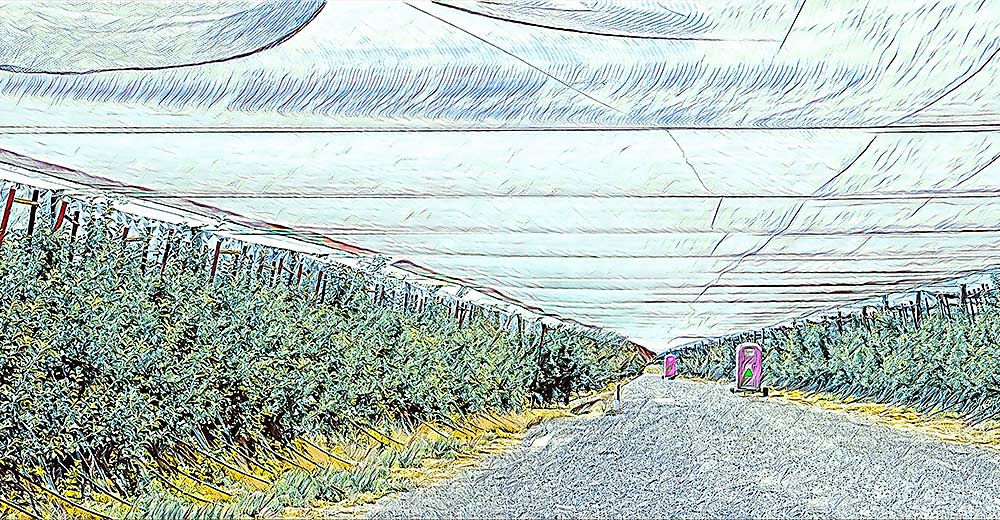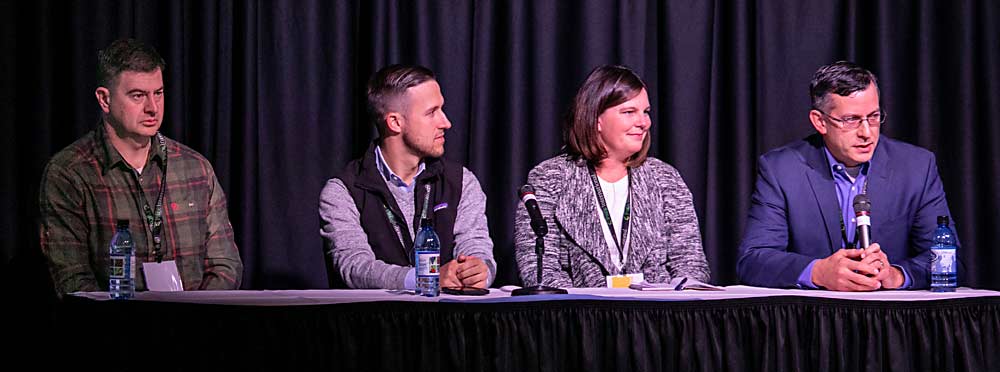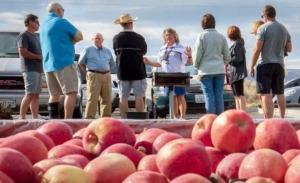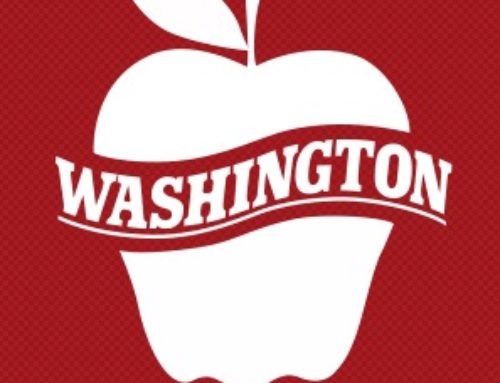
The success of the Washington apple industry has attracted investors for years, but the pace of outside money pouring in appears to be accelerating even as the industry struggles with shrinking profit margins.
That’s not as contradictory as it might seem, according to Scott Porter of Cascadia Capital, a Seattle-based investment bank.
Right now, many fruit companies need access to capital to push through the present challenges, while investors, flush with cash, are looking to hedge against inflation and a macroeconomic downturn by buying farmland. Add in the continued trend of growers retiring and the increasing outside interest in the value of Washington’s water supply and sustainable growing climate, and it starts to make sense why investment is up even as apple profits are down.
Institutional investment firms have been around for many years, and they are growing. “In the last 10 years, the amount of capital has more than tripled, and people need to put this money to work,” said Porter, who leads Cascadia Capital’s agribusiness practice and has handled several mergers and acquisitions in the tree fruit industry.
Simultaneously, the tree fruit industry is more capital-intensive than ever, and traditional lending options are limited.
“Many producers overextended themselves a little bit with the replanting and varietal innovation pushing the cost of doing business higher than ever before,” Porter told Good Fruit Grower. “It’s becoming a game of scale, and business owners are struggling to keep up on their own.”
The Washington State Tree Fruit Association invited Porter to speak at its annual meeting in December, amid growing questions and concerns about how outside investment is changing a traditionally family-owned industry.
“There’s a lot of fear of the unknown,” said Jared England, general manager of Manson Growers, a longstanding cooperative that recently partnered with an institutional investor. He organized the session hosting Porter and others. “We want to have the ability for people to ask questions and hear from people who have gone through the experience.”
Good Fruit Grower conversations in 2022 with growers large and small revealed increasing concerns about how remaining family-owned businesses can compete with those seeing an influx of outside capital — and the trickle-down ramifications to rural communities when these longtime companies are no longer locally owned.
“Across our state, quietly and invisibly, we’re seeing family farms sold to institutional investors,” Kristin Kershaw, co-owner of Kershaw Cos. and director of corporate affairs for Domex Superfresh Growers, told reporters during a November press conference about the need for labor and immigration reform. “These family farms and our food producers are no longer going to be controlled and owned by our rural communities. That has a profound effect on both the political and social landscape.”
Or, as one young grower put it: “Whose name is going to be on the baseball fields now?”
The capital
It’s not just the tree fruit industry. Across the country, investors’ interest in farmland is helping to push the price of cropland to record highs. Nationwide, cropland value rose 23 percent from 2020 to 2022, according to the U.S. Department of Agriculture, while Washington’s irrigated acreage increased 10 percent.
Uncertain economic outlooks tend to push investors toward farmland, said Michael Brady, an economics professor at Washington State University. Given growing concerns about climate change, Washington’s farmland, climate and water rights look like increasingly valuable assets for the long term.
At the same time, rising demand for sustainable investment options, also known as ESG (for environmental, social and governance) investing, creates a new driving force for farmland investment.
For example, the recent Goldman Sachs investment in a merger of Columbia Fruit Packers and Frosty Packing was completed through the firm’s sustainable investment arm. Part of the deal calls for deploying the influx of capital to adopt more regenerative agricultural practices that reduce the climate impacts of food production, said Detlef Schoen, a consultant who worked on the deal.
“I believe tree fruit is, on a risk-adjusted basis, one of the most attractive propositions in the investment space right now,” said Schoen, whose U.K.-based firm, NewAg Partners, seeks to match private capital with climate-friendly opportunities in agriculture.
When investors see an industry that is largely liquidity-constrained — or limited in the amount of capital that companies have or can borrow — they see an opportunity to create a competitive advantage.
Farmers may be wary of Wall Street generally, but there’s an important distinction to draw between private equity firms, which look to buy and flip businesses for a profit in five years, and institutional investors such as pension funds and asset managers that are looking much more at the long term. And most of the investors in the tree fruit space are the latter, Schoen and Porter said.
“To me, that is the best money an industry can wish for,” Schoen said. “It’s not predatory; it partners long-term and is not scared by the unavoidable ups and downs in the business.”
Over the past few years, major deals include investment by the Ontario Teachers Pension Plan, which bought Broetje Orchards and created FirstFruits; Fiera Comox, which invested in Auvil Fruit; and International Farming, a North Carolina-based group that created Columbia River Orchards by acquiring Legacy Fruit, Larson Fruit and Valley Fruit in 2019, acquired Chelan Fruit in 2021, and invested in Manson Growers in 2022.
Agriculture-specific funds have become more common: Arable Capital Partners acquired Royal Ridge Fruits in 2021; Tiverton Advisors invested in Monson Fruit Co. in 2022; and Solum Partners, an ag-focused spinoff of the Harvard Management Co. that has owned Taggares Fruit Co.’s Snake River Orchard for several years, recently partnered with CPC International.
Meanwhile, private family offices — investment arms of the country’s wealthiest families — are also actively forming partnerships.
The assets
Tree fruit businesses seek outside investment for many reasons. (Check out the January 1, 2019, issue of Good Fruit Grower for more on why and how growers look for investment partners.) Retirement drives many deals, particularly if a grower doesn’t have a successor. The influx of cash can help the retiree cash out either way.
“We see (private equity investment) predominantly driven by generational handover issues and the desire to stay in the business but not having the capital to take the business to the next level and grow as others get out,” Schoen said.
Other times, investment helps a business scale or modernize to stay competitive.
That was the case for Manson Growers, England said. By selling shares in the former cooperative to International Farming, the growers each received a payout that they are using to modernize their orchards as well as the company’s orchards.
“We have a lot of older varieties and lower-density plantings, so we were looking at a large investment just getting back on the front edge of the variety mix,” England said. Traditional bank financing looked more expensive to acquire.
The company also installed new presize equipment in November.
Beyond the capital itself, Manson Growers benefits from being part of a larger organization, from economies of scale for chemical purchases to access to expertise. England called International Farming, which already owned nearby Chelan Fruit, the right fit for Manson Growers. Of its 80-odd members, the vote to support the partnership was nearly unanimous.
“They understand the dynamics at play in our industry,” he said. “We went in very skeptical and evaluated a lot of potential investors, and we were patient and waited until we found a good fit.”
International Farming declined to comment for this article.
The future
Investors today aren’t just looking for takeover acquisitions. It’s becoming more common to keep previous management in place or to acquire a majority share but keep previous owners onboard.
“Investors are realizing that they are investors, not operators. They want to invest in the best people and have them stay and run it, with skin in the game to commit to build value,” Porter said.
For England, this was a big factor in making the co-op’s growers comfortable with the transaction.
“We thought it was a good indicator that they valued that partnership,” he said.
Another trend Porter sees: investors purchasing existing orchards, rather than planting their own, as was more common about five years ago.
He expects to see more deals in the coming months, as the economic downturn persists and long-term investors look for opportunities to acquire assets on the cheap.
“They don’t have to play a five-year or 10-year timeline. If you look back, this industry is always up and to the right in terms of land values and returns,” Porter said.
But who won’t be purchasing? Other family-owned fruit companies.
“I don’t believe we will see grower-to-grower transactions at this scale,” Porter said. “Any vertically integrated operation, no way.”
by Kate Prengaman

The Auvil Fruit experience
Chris McCarthy, CEO of Auvil Fruit, joined a panel discussion with Jared England of Manson Growers, Scott Porter of Cascadia Capital and Kelli Visser of accounting firm Larson Gross to talk about outside investment in agriculture at the Washington State Tree Fruit Association Annual Meeting in December.
McCarthy said Auvil, based in Orondo, signed with equity partners in September 2019, and the partnership helped the company stay liquid and secure throughout the 2020 pandemic restrictions, the 2021 heat dome and the poor 2022 pollination weather. The investors were patient with all three misfortunes.
The relationship requires some healthy give and take, McCarthy said. The investors don’t tell Auvil managers how to farm, but they insist on accountability for decisions. They also bring new ideas to the table from other industries they fund.
“It’s good to go through the process of someone playing a little bit of devil’s advocate,” McCarthy said.
—by Ross Courtney








Leave A Comment